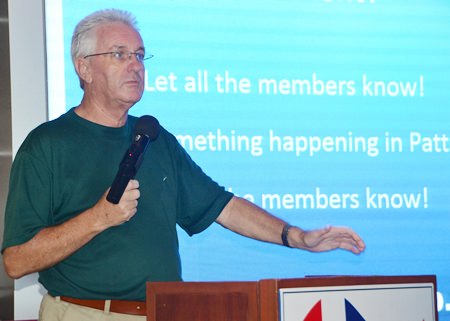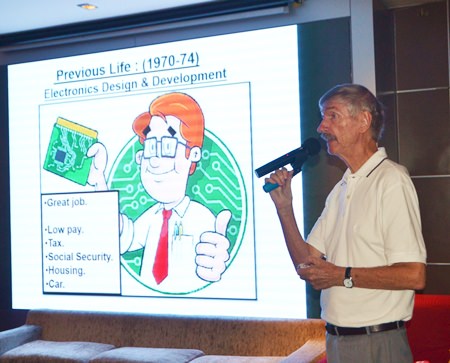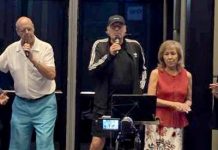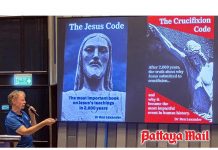Pattaya City Expats Club member Ian Frame spent three years searching for oil in Saudi Arabia. Did he find any? Read on!
Ian, who was the PCEC guest speaker on October 4, gave a fascinating account of what he called “the most exciting period of my life,” working as a Seismic Observer/Instrument Engineer in Saudi Arabia from 1974 to 1977. He was responsible for running a Seismic Line, which basically consisted of sending sound waves into the ground and measuring the time taken for the waves to travel from the source, reflect off underground structures, and return to geophone sensors on the surface. Using the recordings made, geophysicists attempt to determine whether or not oil/gas might exist beneath the surface.
 Tony Heron conducts the PCEC’s Open Forum Session during the meeting where questions are asked or comments made on Expat living in Pattaya.
Tony Heron conducts the PCEC’s Open Forum Session during the meeting where questions are asked or comments made on Expat living in Pattaya.
Ian’s job was to synchronize the actions of the Seismic Line Crew and record the signals received from the geophones. The seismic crew consisted mostly of local Bedouin. The locals were used to move the seismic cables and position the geophones in predetermined patterns. Some specialized jobs such as party manager, geophysicist, observer, surveyor, mechanic and driller were taken by expatriates. Several nationalities could be found these crews, e.g. American, Canadian, Australian, and British.
Ian said that the line was constantly moving, and the crew had to continuously move the sensors from the back to the front of the line. The day started at about 4:30 a.m., and they worked seven days a week for five weeks at a time, followed by two weeks off.
While the job paid extremely well, with no taxes, and offered travel and adventure, Ian said living in the desert also presented some challenges. “It’s sheer luck that I’m still here,” he said. “I got lost many times because there were few landmarks. Tire tracks soon got covered over with sand, so it was difficult finding directions.”
Driving in soft sand & over sand dunes could be fun, he said, but if you rolled your truck you were likely to be sent home. You were unlikely to get a second chance. The air temperatures could reach 55 degrees Celsius (131 degrees Fahrenheit), but fortunately it was a dry heat. When it was windy, the static electricity was such that you would get a shock when reaching for your truck door handle. Ian used a high value resistor to discharge the truck slowly. The shamals (strong northwesterly winds) were so strong that you could not drive in the resulting sand storms.
 PCEC Member Ian Frame highlights some of the benefits that caused him to leave his job in the UK and travel to Saudi Arabia to spend 4 years in the desert searching for oil.
PCEC Member Ian Frame highlights some of the benefits that caused him to leave his job in the UK and travel to Saudi Arabia to spend 4 years in the desert searching for oil.
Ian related several times when he got into tense situations. “One day I was driving up the seismic line performing checks – when suddenly someone was standing in front of me with a rifle. I couldn’t communicate with him because he was speaking Arabic. I called my foreman on the radio to come and talk with him. Apparently he was upset because my crew had been driving by his camp, looking at his four wives. I assured him via my foreman that it wouldn’t happen again.”
One day in 1976, Ian got a radio call from a mechanic saying that he had damaged the Dammam-Riyadh railway track. The problem was that the vibration pad on a large vibrator machine had not been fully retracted when crossing the line. “The train was due in 15 minutes, so we drove along the track toward the train to warn it to stop,” recalled Ian. “I could see the train coming at me through the heat haze, like in a movie. The train and I were both flashing our lights, and hooting our horns. Fortunately he stopped at the last moment.” Luckily the train had laborers on board. They took the rails from behind the train and laid them in front. The train was delayed three to four hours, and a nasty letter from a government department followed. From then on, they were required to inform the train company before crossing any tracks with heavy equipment.
One of the major perks of Ian’s job was that after working five straight weeks, he got two weeks off. The company paid the equivalent of an air ticket from Dhahran to Beirut, and also provided a healthy per diem. So he visited numerous countries, and one of them was Thailand. The rest, as they say, was history.
So did Ian find oil? “I would never have known if we found oil or not,” he said. “We just produced data related to what was underneath the sand. I sent this recorded data to town, where it was analyzed by the geophysicists.”
After the presentation, MC Roy Albiston brought everyone up to date on upcoming events and called on Tony Heron to conduct the Open Forum, where questions are asked and answered about Expat living in Thailand, especially Pattaya. For more information on the PCEC’s many activities, visit their website at www.pcecclub.org.




